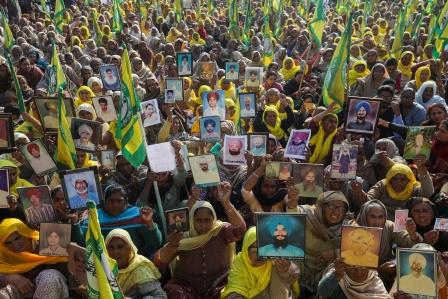While the PM has stayed away from direct questions from media (read unbiased) and people for more than six years, the farmers’ protests are gathering steam with numerous heads adding into the protests on a daily basis. The PM is so far from truth and ground reality that he held a meeting with farmers’ group in Kutch for a photo-opportunity and has continuously avoided direct interaction with farmers near Delhi borders which likely scares him. While the PM speaks vacuously about the rights of women, he has seemingly remained oblivious of the fact that many women are gathering in the protests, that too in large numbers.
Many hundreds of Indian women, including many widows of farmers who were believed to have killed themselves over pilling debt, joined the protest against government reforms that farmers say threaten their livelihoods. Farmers have been protesting for nearly a month over the reforms, enacted in September, to deregulate the agriculture sector, allowing farmers to sell to buyers beyond government-regulated wholesale markets.
Small farmers fear that the changes will mean the end of guaranteed minimum prices for their crops and leave them at the mercy of big retailers especially under Ambani and Adani groups.
A widow from Punjab state, 40-year-old Harshdeep Kaur, at one protest site on the outskirts of the capital, New Delhi, said, “If these black laws come, more farmers will go deeper into debt.” She further added, “More mothers and sisters will become widows like me.”
Suicide by struggling farmers has been a problem in India for years. Nearly 10,350 farmers and agricultural labourers committed suicide in 2018, making up almost 8% of all suicides in India, according to the National Crime Records Bureau.
Kaur said that her husband committed suicide three years ago after running up debts of 500,000 rupees (nearly $7,000). As she spoke, she held a passport sized photo of him. The reforms, contained in three laws, loosen rules around the sale, pricing, and storage of farm produce. Many experts including Kaushik Basu have opined that the laws have glaring loopholes, and these observations have been avoided by the GOI.
Prime Minister has tried to assure farmers that the changes will bring them new opportunities but few have been convinced. Several rounds of talks between farm union leaders and the government have failed.
“We will keep protesting,” said Gurbax Singh, a farmer union leader at a north Delhi protest site. The farmers have gathered at various sites around the capital since late last month, blocking traffic and clashing with police, at least in the early days of their action. Singh said that dozens of buses, tractors, and cars were being arranged to bring more women from Punjab, the epicentre of the agitation.
The protesters have occupied several kilometres of a busy main road in western Delhi and other entry points into the capital with their tractors. At a nearby protest site, old farmers lounged in ramshackle shelters beside medical stalls and makeshift kitchens. Kaur said that she and other women were prepared to protest until the laws were repealed. “More women will come,” she said.
It looks like the year which began with a disturbing series of protests due to CAA-NRC which spilled into riots, with the situation getting worsened due to the Covid19 Pandemic, and exacerbated by an overconfident propagandist





